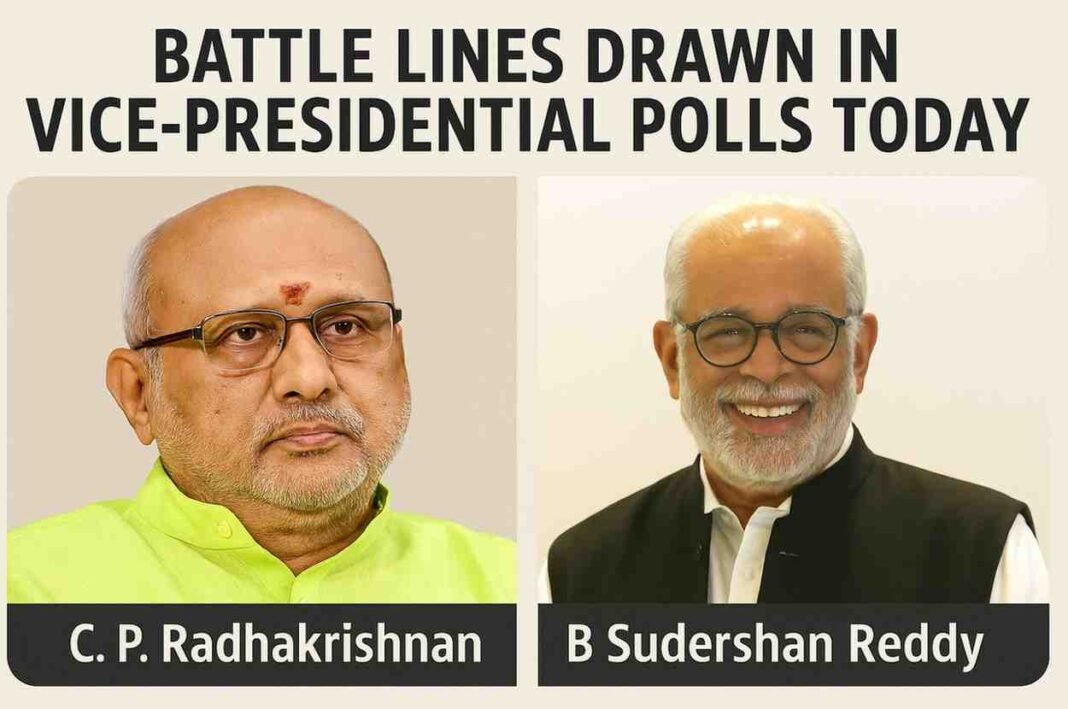A Crucial Contest for the Nation’s Second-Highest Office
India is witnessing another defining political moment as MPs gather in Parliament House today to elect the country’s 14th Vice President. The election comes just fifty days after Jagdeep Dhankhar resigned on July 21, citing health concerns. His abrupt exit created a vacancy at the nation’s second-highest constitutional office and set the stage for a fresh battle between the ruling National Democratic Alliance (NDA) and the opposition’s INDIA bloc.
The Vice President also serves as the Chairperson of the Rajya Sabha, making the position politically significant at a time when legislative battles are becoming sharper and more contentious. The outcome will therefore be closely watched not only for who wins but also for what the margin of victory reveals about shifting political dynamics.
Voting Begins Amid Heavy Political Presence
Polling began at 10 am inside Parliament House, with Prime Minister Narendra Modi casting the first vote. Soon after, senior opposition leaders Sonia Gandhi, Priyanka Gandhi, and Congress President Mallikarjun Kharge marked their ballots, underscoring the intensity of the contest. From the government’s side, BJP President JP Nadda and Union Minister Nitin Gadkari were among the first to exercise their franchise.
Voting will continue until 5 pm, after which the sealed ballots will be counted. By nightfall, India will know who will occupy the Vice President’s chair for the next five years.
The Contenders: Experience Meets Ideology
The NDA’s candidate, CP Radhakrishnan, 68, is a seasoned politician from Tamil Nadu. A two-time Lok Sabha MP representing Coimbatore, he currently serves as the Governor of Maharashtra. Belonging to the Gounder-Kongu Vellalar OBC community, Radhakrishnan has projected his candidacy as a vote for “Indian nationalism” and the vision of a “Viksit Bharat.”
Facing him is the INDIA bloc’s nominee, Justice B Sudershan Reddy, 79, a retired Supreme Court judge from Telangana. Justice Reddy is well known for his landmark rulings, including judgments against the Salwa Judum vigilante movement and on black-money investigations. In his campaign, he has appealed to the “conscience of parliamentarians,” positioning his bid as one rooted in moral clarity and constitutional values.
The Numbers Game
The Vice President is elected through an electoral college comprising members of both Houses of Parliament. This year, the college has 781 MPs—238 from the Rajya Sabha and 542 from the Lok Sabha. However, with the BRS and BJD opting to abstain, the effective voting strength has reduced to 770, fixing the majority mark at 386.
Voting takes place through a secret ballot under the proportional representation system with a single transferable vote. MPs rank their choices in order of preference, and any ambiguous or incorrectly marked ballot is declared invalid. Special provisions have been made for MPs in preventive detention, such as Sheikh Abdul Rashid and Amritpal Singh, to vote via postal ballot.
On paper, the NDA enjoys a comfortable edge, commanding 425 MPs with additional support from the YSR Congress. Reports suggest even AAP’s lone MP, Swati Maliwal, may back the NDA, potentially taking the ruling alliance’s tally to 436. The INDIA bloc, meanwhile, counts 324 MPs firmly in its corner, with a handful of independents and smaller parties yet to declare their stance.
Stakes and Expected Outcome
Analysts suggest that while the NDA has the numbers to secure victory, the margin of difference may be narrower than in 2022, when Jagdeep Dhankhar defeated Margaret Alva by 346 votes. This time, the expected gap is around 100 to 125 votes, reflecting the INDIA bloc’s stronger presence in Parliament.
The secret ballot, however, leaves room for cross-voting, a factor that could alter the final tally. A slimmer margin for the NDA candidate, or evidence of cross-party defections, would lend moral heft to Justice Reddy’s campaign and provide the opposition with symbolic momentum.
Why This Election Matters
Beyond the arithmetic, the Vice-Presidential election is a barometer of political influence inside Parliament. With the Rajya Sabha Chairperson playing a decisive role in managing proceedings, the victor’s ability to preside over increasingly fractious debates will be critical. For the NDA, a decisive win would reinforce its dominance and morale ahead of future parliamentary sessions. For the INDIA bloc, even a reduced-margin defeat would signal resilience and unity in the face of numerical disadvantage.
As counting begins tonight, the result will settle the immediate question of succession but open fresh debates about India’s political balance. The Vice President may be a constitutional figurehead, but today’s vote will resonate far beyond the Rajya Sabha’s chambers.








